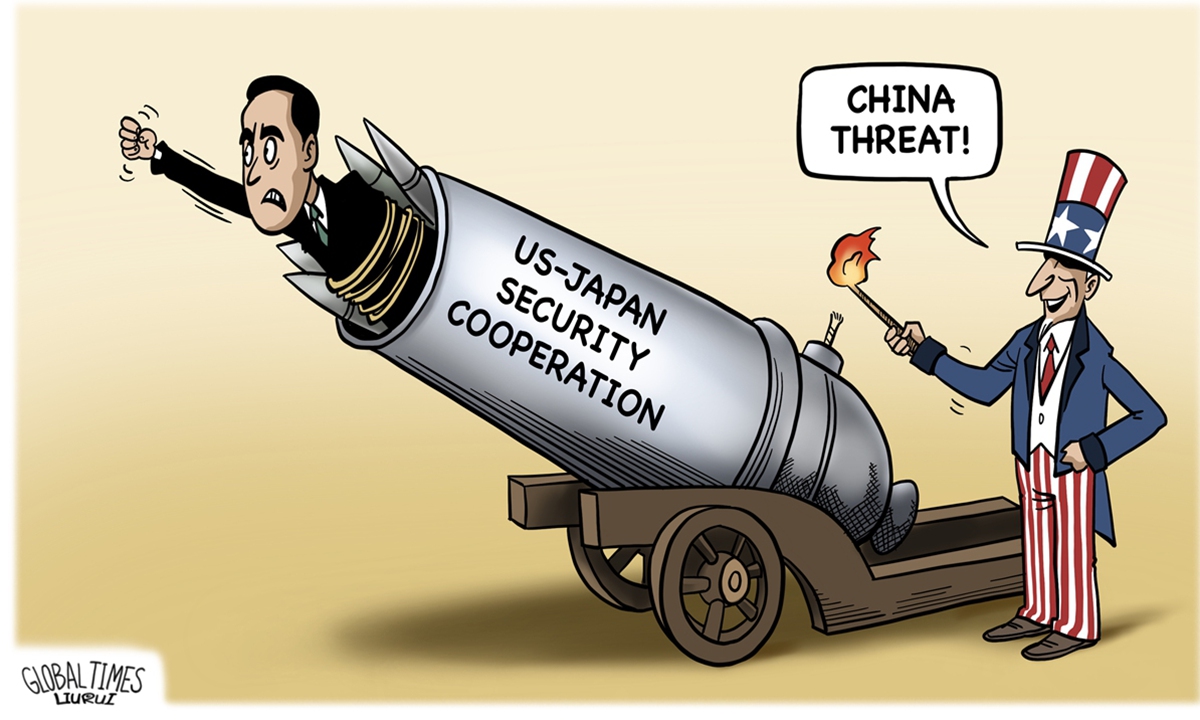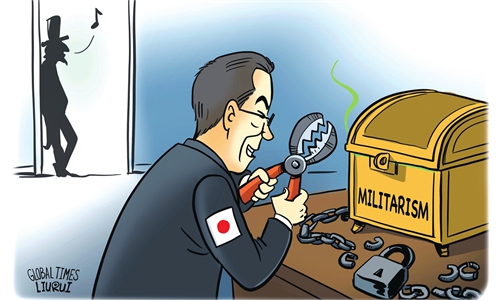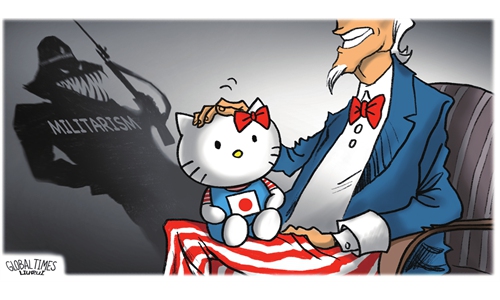
Illustration: Liu Rui/GT
According to several media reports, the US-Japan "two-plus-two" foreign and defense ministers' talks held in Tokyo on Sunday would discuss the matter of creating a unified command within the existing US Forces Japan. The two countries are anticipated to launch a working group over this issue, which will be mentioned in a joint statement. This marks "one of the biggest upgrades to the Japan-based forces in the post-World War II era," commented Japanese media outlet Nikkei Asia.
This defense department, which is still in the planning stage, will serve as a US counterpart for Japan's unified command. In May, Japan's parliament enacted new laws to establish a joint command headquarters for the country's Self-Defense Forces (SDF) by the end of March 2025. Military experts said that the latest move in the US-Japan defense cooperation proves that the two countries are stepping up the promotion of military integration, which may even lead to a US-Japan joint operations command in the true sense.
This upgrade is, in fact, Washington's move to tie Tokyo further to the US' Asia-Pacific chariot, aiming to incite conflict and chaos. But on the other hand, while pushing for the improvement of its SDF's combat capabilities, Japan in recent years seems willing to see its forces "bundled" with the US-stationed troops.
As a vital helper to Washington's promotion of its "Indo-Pacific Strategy," Tokyo has its own geopolitical agenda. Japan aims to please its mighty ally in exchange for more unshackling of its military capabilities. Furthermore, it uses the hype of the so-called dangers in the "Indo-Pacific" to scare the Japanese public, justifying its military ambitions, such as strengthening the "defense" capabilities of the SDF and the cooperation with the US troops.
Overall, closer military cooperation between the US and Japan will clearly facilitate Washington's ambition of creating an "Asia-Pacific NATO." The US is now strengthening its bilateral partnership with other regional countries while setting up minilateral alliances, paving the way to a possible multilateral defense bloc in the Asia-Pacific. The strengthening of its defense cooperation with Tokyo is also a step in this direction, which will inevitably create tremendous and dangerous barriers to regional peace and stability.
Since both Washington and Tokyo have vowed their commitment to defend the island of Taiwan, a US-Japan unified command will only allow the two countries to intervene more readily in the Taiwan Straits if a conflict were to break out, according to some Taiwan media outlets.
Taiwan's Democratic Progressive Party (DPP) authorities will also certainly misinterpret this upgrade. The false perception that Washington and Tokyo will come to "save the day" will further embolden Taiwan secessionist forces to refuse to accept the one-China principle or even confront the Chinese mainland with more provocative moves. Moreover, on this basis, the DPP authorities will further strengthen its collusion with the US and Japan. The DPP authorities' misjudgment on this issue will only intensify the situation of the Taiwan Straits.
With the possibility that Taiwan secessionists could take the "free ride" of closer US-Japan military cooperation to stir up more troubles, Chinese Foreign Minister Wang Yi, when meeting with US Secretary of State Antony Blinken in Vientiane, Laos on Saturday, emphasizes China's resolute opposition to any interference, maneuvering or provocation relating to the Taiwan question.
On the Taiwan region, Wang said: "Each time 'Taiwan independence' forces make provocation, we will definitely take countermeasures." This is actually a warning to the DPP authorities and the Taiwan secessionists. No matter which external force supports them to provoke the matter, the Chinese mainland will fight back. When the provocation reaches the extreme, the counterattack will also become the strongest.
The Taiwan question is a matter of China's internal affairs, and other countries, like the US and Japan, have no reason to interfere. Wang's statement warns against the US and Japan for taking the Taiwan question as a pretext to bolster their bilateral military cooperation and interfering in the Taiwan question directly, Xin Qiang, deputy director of the Center for American Studies at Fudan University, told the Global Times.
No matter who comes to power next year after the upcoming presidential election in the US, the US' tough stance on China-related issues will remain, and Washington will continue to challenge the one-China principle. However, the further it tramples on China's red lines, including condoning and even encouraging "Taiwan independence," the stronger the counterattack it will suffer. This is a stern warning to both Taiwan secessionists and external forces dreaming about playing the "Taiwan card" against China.
The author is a reporter with the Global Times. opinion@globaltimes.com.cn



